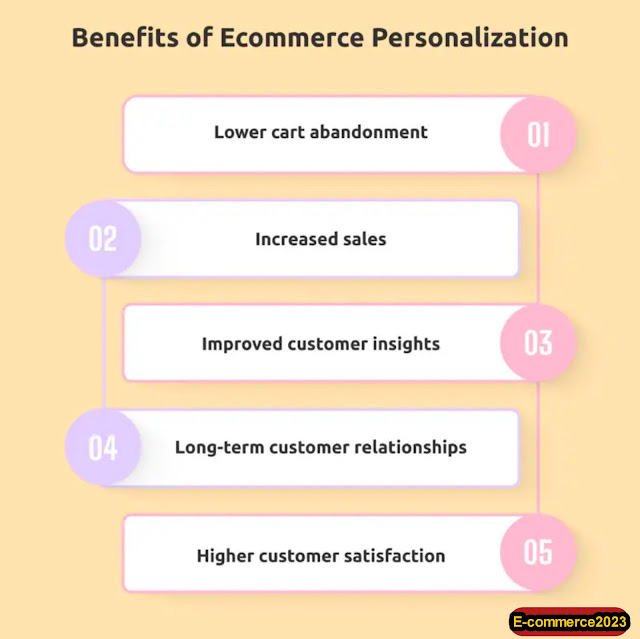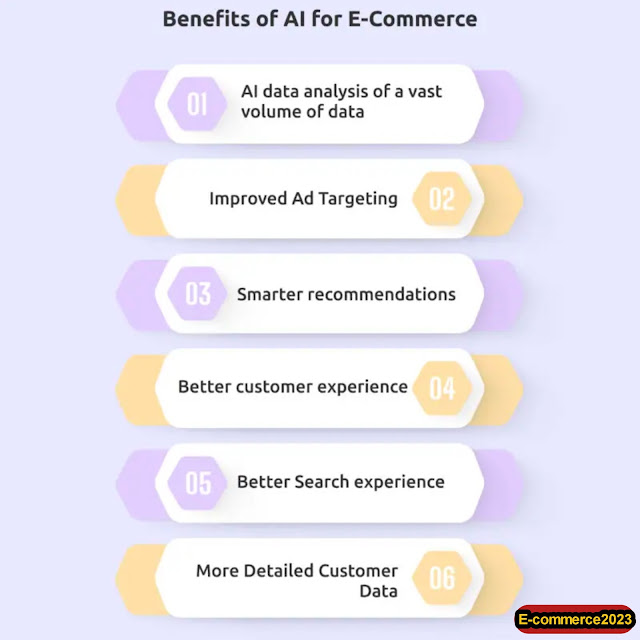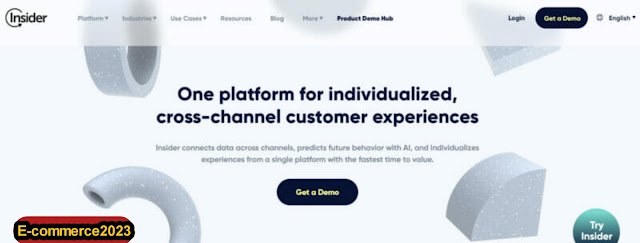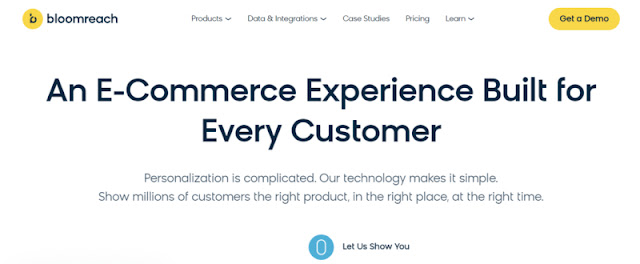The role of artificial intelligence personalization in the development of e-commerce
E-commerce has grown exponentially over the past decade, generating $900 billion in sales by 2022 in the US market alone. The U.S. is expected to reach $1.7 trillion by 2027, and global e-commerce retail sales will reach $8.1 trillion by 2026. As sales grow, so will the number of online stores, and it is estimated that the number of global e-commerce websites will increase by 24 million worldwide by 2022, catering to 2 billion digital website buyers.
There is no doubt that e-commerce is growing, but the growth has also led to a wide range of choices that consumers cannot resist. Customers with thousands of options end up choosing nothing, resulting in 70% cart abandonment.
Additionally, the highly competitive e-commerce industry is forcing brands to provide a better shopping experience if they want consumers to choose among a sea of competing products.
To solve both of these problems, e-commerce stores are turning to a personalized shopping experience. Personalization is key to attracting new users and increasing repeat purchases. With advancements in artificial intelligence solutions, e-commerce stores are more capable than ever of delivering a superior shopping experience.
The Importance of Personalization in Ecommerce
Personalization is critical to engaging shoppers, increasing repeat purchases and increasing conversions. It's a tried-and-true tactic for increasing sales, and it comes in many forms, such as personalized product recommendations and readiness tests.
Personalization provides shoppers with a personalized experience that better fits their needs and tastes. Instead of asking shoppers to scroll through thousands of products to find the perfect match, personalization uses customer data to predict what they're most likely to buy based on past purchases, browsing behavior, demographics, and other data points.
By offering a personalized shopping experience, e-commerce brands are trying to:
Done right, personalization has the potential to create brand loyalty, but done poorly, it can damage a brand's reputation. Therefore, an effective and well-planned allocation strategy must be implemented. However, with so much customer data to process and analyze, it can be difficult to know where to start.
This is where the benefits and capabilities of AI come into play. By leveraging artificial intelligence technology, companies can analyze vast amounts of data to gain valuable insights into customer preferences and behavior. This enables businesses to create a more personalized and relevant shopping experience to increase customer satisfaction and loyalty and drive business growth.
The Role of AI Personalization in Ecommerce
Artificial intelligence is no longer the stuff of sci-fi movies and books. It has become ubiquitous in our daily lives, with applications impacting every major industry, including online retail. With millions of customer data points, e-commerce is a ripe candidate for AI technology.
Using artificial intelligence, brands can provide customers with a personalized shopping experience in seconds, with little to no human intervention.
AI personalization uses machine learning, natural language processing (NLP) and deep learning to create personalized brand messages, content, products and services, resulting in profitable customer journeys. Think of it as giving each customer a personal salesperson when they visit your store.
In brick-and-mortar retail stores, salespeople attend to each customer and recommend products based on the customer's order and their analysis of people. For example, if an older woman comes into a store to buy a work shirt, the server will recommend a conservative shirt over a casual one.
It enables this AI customization for each customer instantly. Therefore, each customer journey is unique and website visitors are only exposed to relevant products.
Benefits of Using AI Personalization
AI-driven personalization has many advantages over using basic e-commerce personalization methods.
- AI mines and reads vast amounts of data so brands can gain deeper insights that lead to better and more accurate personalized customer journeys.
- AI improves ad targeting, resulting in more effective ads that reduce marketing spend and increase revenue.
- AI generates smarter, personalized recommendations for products that match customers' current purchases, increasing sales revenue.
- AI-powered chatbots go beyond automated and scripted responses and use NLP, sentiment analysis, and other AI techniques to provide shoppers with a better customer support experience.
- AI creates a better search experience by understanding the nuances of human language so it can show relevant results even when customers don't type in keywords exactly.
- AI provides critical customer data to help brands improve their products and operations to address customer pain points and deliver the best possible customer experience.
While personalization has been around for a long time, artificial intelligence takes it to the next level, delighting customers and brands alike. Customers will find that shopping online will draw them back rather than stress them out, and brands will provide a better shopping experience, leading to increased revenue.
Use Cases for AI Customization in E-Commerce
56% of customers expect personalization and 69% of consumers are willing to use AI to enhance their experience. However, the following are common use cases for customizing AI for e-commerce.
Optimizing Your Ecommerce Homepage
It helps to provide a personalized user journey from the ground up. First-time visitors behave differently than repeat visitors, and the use of artificial intelligence can help create a unique experience for each of them.
For new visitors for whom you don't have historical data, you should probably offer them the generally best-selling items. On the other hand, you have a wealth of information about repeat customers, such as past purchases, favorite categories, and browsing history, so you can tailor their homepage to their expectations.
You can show returning visitors what items they left in their cart, when their favorite categories were on sale, or their recent browsing history. This will create a unique personal journey that encourages them to buy more.
Revolutionize category pages with AI-powered personalization for seamless navigation and enhanced product discovery
If you run a large e-commerce site, you'll likely divide your products into categories—from general subcategories to specific subcategories. It can be difficult for customers to browse these product categories to find the items they need.
With the help of AI personalization, you can direct each shopper to exactly the right category and subcategory and showcase related products that work well together. For example, if you run an online fashion store, you'll have categories for shirts, dresses, pants, and so on. Using artificial intelligence, you can further refine these categories to include sweatshirts by season or style, helping customers find exactly what they're looking for.
Boost customer engagement on product detail pages
When shoppers view a product's detail page, they're interested in learning more about the item and whether it fits their needs. You can use this information to further guide them and close the deal. With AI customization tools, you can show alternatives to what your customers are watching so they can make better decisions by comparing available options.
You can also showcase frequently purchased items together, providing a better user experience by suggesting free products they might want when making a purchase. These methods will keep customers engaged with your website longer and prevent them from bouncing back to other stores that offer a full experience.
Maximize sales on cart and checkout pages
Now that your customers are about to complete their purchase, you can still make AI-based recommendations to increase cart value. Based on what's in their cart, you can recommend frequently purchased items or products that match their purchases. For example, if they buy an electronic device, you can provide a case or batteries.
If customers are frequently buying items they have bought before, AI can detect if they are missing something and make suggestions to remind them to add these items to their cart.
Improve customer retention with a thank you page
An order confirmation or thank you page is still a great place to offer many AI suggestions to improve the customer experience. You can show customers popular items to buy to pique their interest and help them discover new things. You can also display frequently purchased items along with their orders in case they lose something.
If customers have saved items to their wishlist, you can remind them by displaying these and related items on the confirmation page.
Ecommerce stores are full of data that can be used to make the customer's shopping experience engaging, effortless and enjoyable. At every step of the shopping journey, you can use AI to showcase relevant products and help customers find what they need.
Artificial intelligence customization tools for e-commerce
There are several AI customizers on the market designed to help you provide a customized shopping experience. This is the best of them all.
Insider delivers personalized cross-channel experiences, helping marketers connect multiple customer data from different channels and predict their behavior using an artificial intelligence engine. This enables them to create a personalized shopping experience that continues across different customer touchpoints such as websites, social media channels and messaging apps.
Used by top brands such as IKEA, MAC Cosmetics, Estee Lauder, Burger King, Toyota, and Samsung Insider, it is the leading personalization platform with a presence on five continents.
Bloomreach is the eCommerce experience cloud that creates unique customer journeys for millions of customers simultaneously. It features AI discovery to perform personalized research and marketing, a powerful content management system, and marketing automation solutions.
With this tool, eCommerce businesses can grow through lightning-fast AI improvements and revenue-driven customer journeys. Brands using Bloomreach include Bosch, Puma and Marks & Spencer.
MoEngage is an award-winning platform that uses AI-driven insights to provide customers with relevant and engaging experiences across channels. It helps marketers create customer-centric campaigns that leverage customer data to determine the best content, channel and time to reach customers.
This created a winning formula, ensuring increased reach and conversions, leading to an explosion in e-commerce. MoEngage powers 2.2 billion omnichannel experiences every month and is used by more than 1,200 brands.
Clerk.io is an e-commerce personalization software that uses AI-driven technology to acquire, convert and retain customers. Through artificial intelligence, it can automatically analyze customer behavior, identify trends and review past transactions to present relevant product recommendations and search results to existing shoppers.
It also supports email marketing and cross-channel experiences to increase sales by 15-30%. Brands like Jeep, Carlsberg, Stylepit, and Unisport trust Clerk.io to power their e-commerce personalization strategies.
Vue.ai is a comprehensive eCommerce personalization platform that uses artificial intelligence to manage catalogs, image modifications, template images, designs, dynamic 1:1 personalization, and shopper journeys. It helps retailers run effective online stores and deliver unique customer journeys that increase sales and profitability.
Well-known brands using Vue.ai include Diesel, Nordstrom, Columbia, and Johnson & Johnson. The platform also allows you to create custom AI models to meet your business goals and needs.
final thoughts
AI is the future and it is enhancing every aspect of our digital world. It's the answer to the vast number of choices now possible with e-commerce technology, and it's the key to delivering a great customer experience and generating revenue.
As the industry becomes more competitive, eCommerce personalization is becoming increasingly important in customer acquisition and retention. With AI personalization tools, brands can tailor products, promotions and content to the right audience at the right time, increasing brand loyalty and increasing brand relevance.
Frequently asked questions about the role of AI personalization in the development of e-commerce
- How can artificial intelligence be used for personal shopping?
AI is used to personalize shopping, giving customers a personalized experience based on their likes, interests and behavior.
AI algorithms analyze vast amounts of customer data, such as purchase history, browsing behavior, and search queries, to provide personalized product recommendations, promotions, and search results. Additionally, AI chatbots and virtual assistants can act as personal stylists, asking customers about their preferences and making personalized recommendations.
By leveraging AI technologies, retailers can improve customer satisfaction, increase sales, and gain a competitive advantage in the ever-changing retail environment.
- What are the advantages of artificial intelligence in personal shopping?
Artificial intelligence offers many advantages when it comes to personal shopping. AI helps retailers automate the personalization process, reducing the time and resources needed to manually personalize the experience for each customer. This enables retailers to scale their personalization efforts, potentially offering personalized experiences to large customer bases.
Using artificial intelligence, retailers can detect patterns in customer behavior that might not be immediately apparent. This will allow them to offer recommendations and promotions that match the interests and preferences of their customers, even if they are not explicitly mentioned.
Most importantly, AI enables retailers to deliver tailored experiences that increase customer satisfaction and loyalty while increasing sales and revenue.
- What is an example of personalization in e-commerce?
Product recommendations are a common application of AI personalization in e-commerce. For example, if a customer recently purchased a pair of running shoes, the site might recommend other running-related products, such as workout clothes, fitness trackers, or headphones. This personal recommendation saves customers time by showing them products they may be interested in and increasing the likelihood of a purchase.
Another application is personal promotions. For example, a website might offer a customer a discount on a new skincare line if they buy skincare products on a regular basis. This customized promotion motivates customers to make a purchase and shows them that the retailer values their loyalty and interest.








